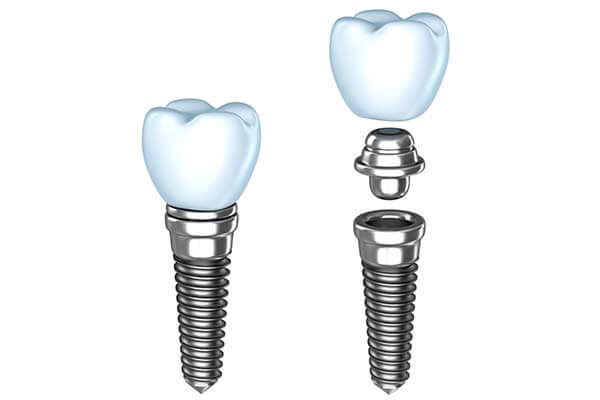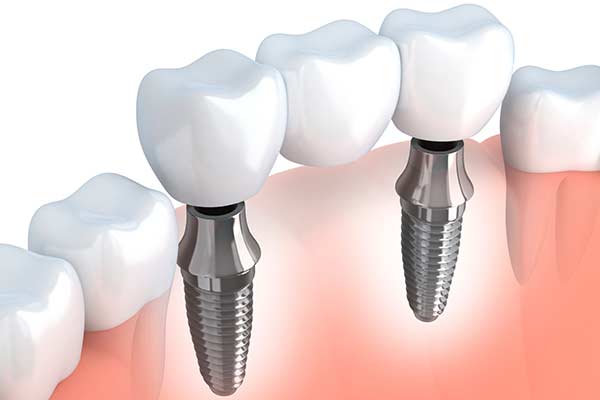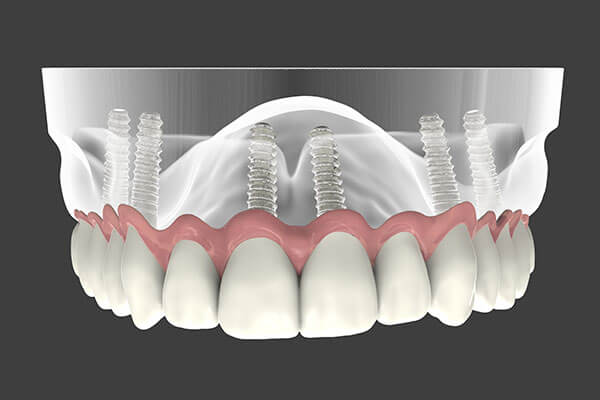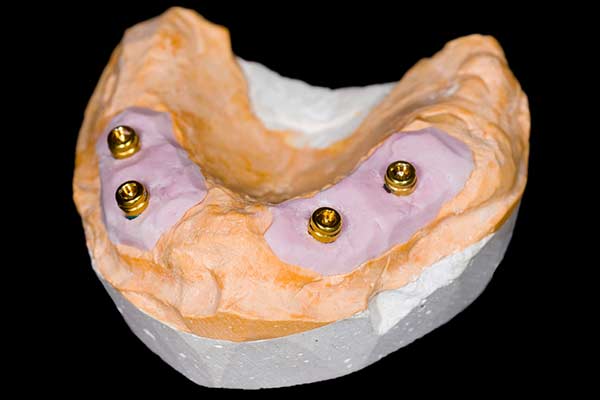Dental Implants in Clifton, NJ
Paramount Dental Arts offer dental implants in Clifton, NJ. Call 973-777-1772 to learn more about the dental implant process or to schedule a restorative dentistry appointment.

What Are Dental Implants?
Whether you are missing one tooth or multiple teeth, you may find dental implant restoration to be the perfect solution. They are, after all, the gold standard in tooth replacement.
A dental implant is a small artificial root made of titanium. It is surgically implanted into the jaw bone with a connector - referred to as an abutment. Dental implants are essentially artificial tooth roots that provide a strong foundation for replacement teeth. Depending on the specific implant, the abutment may be built into or placed on top of the implant post. The crown - or artificial tooth - is then attached to it, giving you a natural-looking, fully-functional replacement tooth.
Unless you tell someone that the implanted tooth isn’t real, no one will ever be able to tell the difference.
Benefits of Dental Implants
Dental implants offer you many benefits for lost teeth that you may not find with other tooth replacements, such as:
- Helps to prevent bone loss
- Blends in with all your natural teeth
- Functions with normal bite force
- Restores self-esteem - and boosts confidence
- A long-lasting tooth alternative
- Not susceptible to dental issues, such as cavities
- Easy to care for and maintain
- Positive impact on speech
- Helps to maintain facial structure
Are You a Good Candidate for Dental Implant Surgery?
The first prerequisite for dental implants is a missing tooth - or a tooth that needs to be extracted. Other than that, a good candidate for implants will possess the following dental health traits:
- Have healthy oral tissue and gums
- Adequate jaw bone and bone quality for support of the implant (or, if not, able to do bone graft)
- Overall good oral health, dental care, and oral hygiene habits
- Non-smoker
- Free from health conditions that may impact healing
Finally, you need to have patience. Dental implants can be very rewarding, but the dental implant process of getting them takes time and is not going to happen overnight.
Why Choose Paramount Dental Arts?
We make it our goal to help you maintain your oral health in ways that can lead to a higher quality of life. For those with a missing single tooth - or teeth - dental implants are that solution. With highly impactful benefits, Paramount Dental Arts wants to be able to transform your smile into one that you can be proud of through smile makeover options. The skilled Dr. Schild has successfully performed this surgery many times and uses the latest dental technologies to ensure a perfect outcome at our dental office.
Don’t go through life hiding your smile, let us help you restore it with dental implants.
The Benefits & Importance of Dental Implants
Want to know more about why you should choose dental implants?
Learn More About the Benefits of Dental Implants
Implant Supported Bridges
An implant supported bridge is a restorative solution for spaces where three or more adjacent teeth are missing. This restoration typically requires two implants to support the porcelain bridge. The bridge provides a functional and aesthetic replacement for a patient’s natural teeth.
What are the advantages of an implant supported bridge?
Because of the natural look and feel of the porcelain and the functional stability provided by the implants, implant supported bridges are an effective solution to replace multiple missing teeth.
A traditional bridge uses teeth on either side of the gap where teeth are missing for support. An implant supported bridge uses two or more dental implants rather than the adjacent teeth for missing multiple teeth. When a bridge uses natural teeth for attachment, the natural teeth must be prepped for crowns and are then subject to increased stress which may be damaging - particularly if the existing tooth, roots, or surrounding bone structure are already compromised. A dental implant supported bridge replaced your missing teeth and avoids putting any additional stress on your natural teeth.

Implant Supported Dentures
For patients who are missing many or all of their teeth, implant supported dentures may be an alternative to traditional dentures. This solution requires the placement of two or more implants. In order to replace a full arch denture, a minimum of four implants is generally recommended. Eligibility for this solution is dependent upon a number of factors, with jaw bone density being one of the most significant determining factors.
Traditional dentures rely on an acrylic base that sits directly on the gums, held in place by a paste or adhesive. Using implants as supports for dentures allows for a smaller and more comfortable base and less shifting of the prosthesis during use.
Implants can support both full and partial dentures as well as both fixed and removable dentures. If a removable denture is selected, the denture will “snap” on to the implant rather than requiring the use of denture paste or adhesives. Removable dentures can be taken out for cleaning at night.
Why should I consider implant-supported dentures over traditional dentures?
This technique offers many advantages over traditional dentures.
Easy to care for, this solution can simulate the look and feel of natural teeth and stay fixed in place with the implants acting as anchors. Patients will not experience the typical rocking and movement or gum irritation associated with dentures.
Dental implant placement can also help alleviate the sunken look that can occur with bone loss in the jaw by stimulating bone growth in the area around the implant. This process can also help prevent future bone loss.

Full Arch with Only Four Implants
This procedure is a unique implant solution that allows patients with a completely edentulous (toothless) upper or lower arch to replace all of the teeth in that arch using only four implants as anchors.

Mini Dental Implants (MDIs)
There are times when a full size implant is not a viable option, and in many cases an MDI may be a great solution. Small spaces or inadequate bone mass in the jaw may prevent the use of traditional implants. Mini Dental Implants are similar to regular implants but, as the name suggests, are significantly smaller in diameter. The placement of MDIs is minimally invasive, often requiring only local anesthetic and no sutures. For this reason, MDIs can often be placed with the final replacement tooth in one day.
How are mini dental implants different from standard dental implants?
In traditional implants, an abutment is attached to the titanium implant screw, and the restoration is then placed on the abutment as shown here.
MDIs are approximately half the diameter of a traditional implant and use a titanium post, rather than a screw. Instead of an abutment piece that supports the final restoration, MDIs use a ball and socket attachment system. The ball on the end of the titanium post (shown above) provides the attachment point for the o-ring in the replacement tooth.
Similarities between MDIs and full size dental implants:
- The implant is inserted into the jawbone.
- The implants, once inserted into the jawbone, are fixed in place.
- The implant serves to replace the tooth root and anchor replacement teeth.
- The placement of the implant can prompt bone regeneration around the placement site.
- The implant can be used to support one or more teeth for crowns or bridges and can also help provide support for removable lower arch dentures.
MDIs may be preferable to full size dental implants in the following situations:
- Bone mass in the jaw is insufficient to support a full size implant screw.
- There is a small space or gap into which to insert the fabricated tooth (such as an incisor as opposed to a molar).
- Children or young adults have congenitally missing teeth.
- Minimally invasive techniques are required due to health or other reasons.
Zygoma Implants
There are times when a full size implant is not a viable option, and in many cases an MDI may be a great solution. Small spaces or inadequate bone mass in the jaw may prevent the use of traditional implants. Mini Dental Implants are similar to regular implants but, as the name suggests, are significantly smaller in diameter. Dental implants typically take 2 visits and require a waiting period of a few months from the time of implant placement to the time the permanent replacement tooth can be placed. The placement of MDIs is minimally invasive, often requiring only local anesthetic and no sutures. For this reason, MDIs can often be placed with the final replacement tooth in one day.
For patients with significant upper jawbone loss, a Zygoma dental implant may offer a unique solution that does not require bone grafting and moves directly to implant placement.
Dental implants typically require sufficient jawbone density and mass for secure implant placement. For patients without sufficient bone structure to support an implant, a bone graft procedure is often necessary prior to implant placement.
Longer than traditional implants, the Zygoma dental implant bypasses the jawbone and attaches the implant directly in the cheekbone, expediting both placement of the dental implant placement and the final restoration.
FAQs
Are dental implants worth it?
It is no secret that dental implants tend to be a costly solution to replacing missing teeth. But they can support the surrounding teeth, offer fully-functional replacement solutions, protect the jaw bone from deteriorating - all while adding to your beautiful smile. So, while they may not be the cheapest solution, they most definitely are the best.
Is there a downside to dental implants?
When it comes to the dental implants themselves, there really isn’t any downside. They are a great, natural-looking alternative - and they function well, too. However, this procedure does tend to be a little costly and may not be completely covered by dental insurance.
How long does a dental implant procedure take?
The process for getting dental implants can be lengthy. For instance, if an extraction or bone grafting is necessary, it will need to heal before the implant can be added. Then, once the titanium post is implanted, it takes time for it to fuse with the jaw bone. When it is ready, you can move forward with getting your crown. It could take a couple of months or even a year to complete the dental implant procedure.
Are dental implants painful?
Getting implants is not painful at all thanks to local anesthesia. After the procedure, mild discomfort may be felt, but nothing that can’t be handled with over-the-counter pain medication.
If you would like to learn more about our dental services or are ready to schedule an appointment, call 973-777-1772.
